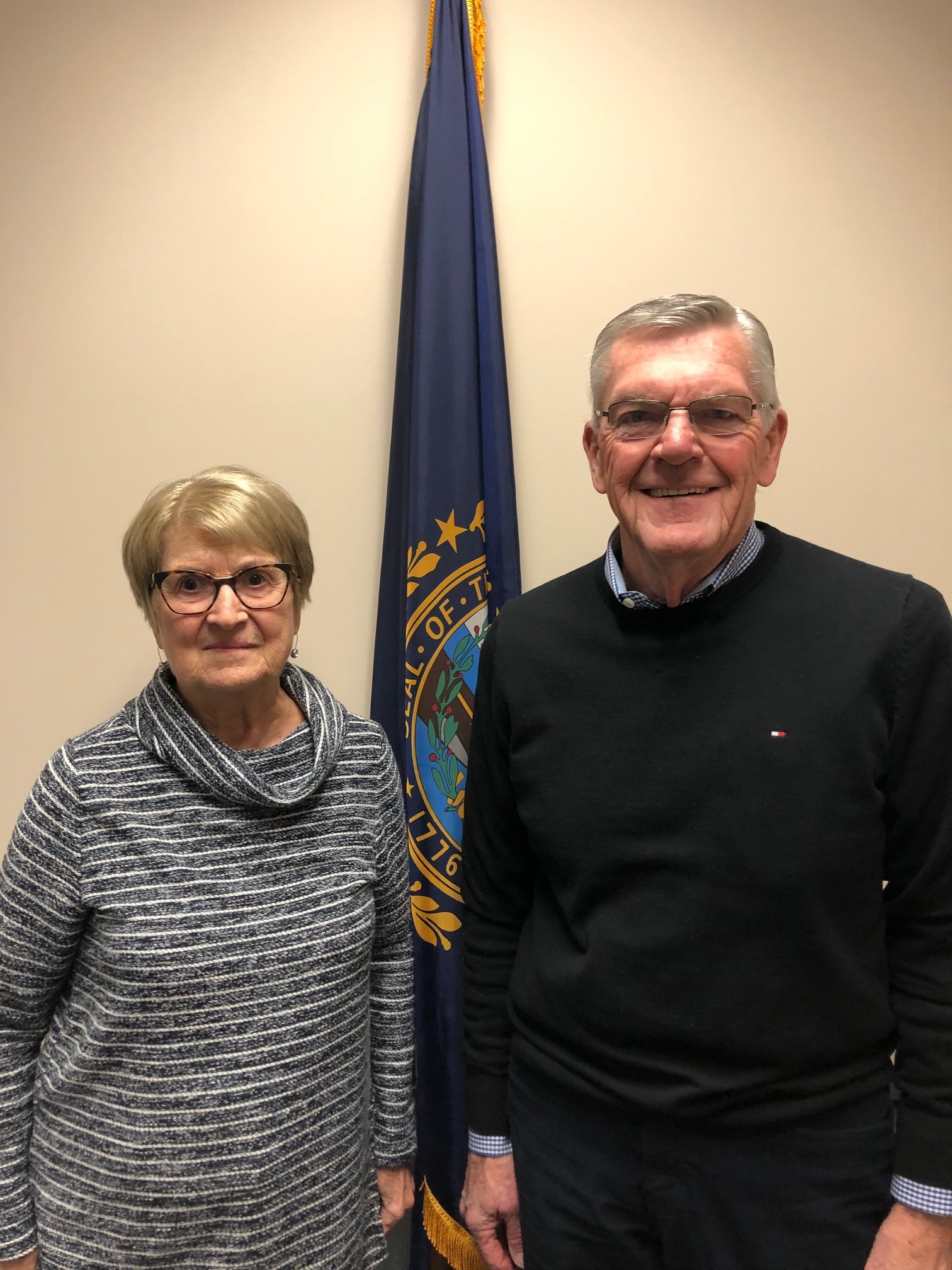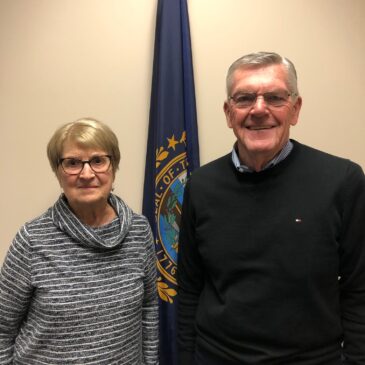Editor’s note: This month’s Special Series on Community Approaches to Addiction focuses on ways to bring addiction prevention and recovery beyond medical settings and into communities. Today, we feature Ed Talbot and Dot Duda, who serve as Executive Director and President of the Board of Directors, respectively, of the New Hampshire Council on Problem Gambling (NHCPG), which was first incorporated in 1997. The NHCPG became inactive for a number of years, but Mr. Talbot, Ms. Duda, and others brought it back to life. In the following, Mr. Talbot and Ms. Duda discuss their work with Heather Gray, Senior Editor of The BASIS and former member of the NHCPG Board of Directors.
Dr. Gray: What inspired you to start working to minimize gambling problems in New Hampshire?
 Mr. Talbot: My personal recovery was greatly influenced by others who preceded me. Their support and encouragement along the way was always accompanied with the suggestion to pass it on. Once I was able to devote the time and energy to bringing services for problem gambling to the state of New Hampshire I was eager to pass on what I had been given.
Mr. Talbot: My personal recovery was greatly influenced by others who preceded me. Their support and encouragement along the way was always accompanied with the suggestion to pass it on. Once I was able to devote the time and energy to bringing services for problem gambling to the state of New Hampshire I was eager to pass on what I had been given.
Ms. Duda: As a clinician, receiving calls from New Hampshire residents looking for treatment inspired me to join forces with Ed Talbot to resurrect the New Hampshire Council. Also, knowing casinos were coming to Massachusetts and that New Hampshire had next to zero services for Gambling Disorder was another motivation. Kathy Scanlon, who retired from the position of Executive Director of the Massachusetts Council on Compulsive Gambling, offered her help to resurrect the New Hampshire Council.
Dr. Gray: How did you learn how to start and run this type of organization?
Mr. Talbot: As an incorporator and later board member and trainer for the Massachusetts Council on Compulsive Gambling, I was able to observe the formation and development of that Council. While serving on that board, I mentioned to my friend and former Executive Director of the Massachusetts Council, Kathy Scanlan, my interest in reorganizing and expanding the New Hampshire Council and she offered her assistance. I retired and became a permanent resident of Madison, New Hampshire and along with an active, energetic and experienced group of professionals have helped establish the New Hampshire Council on Problem Gambling as the resource in the state for this addiction.
Ms. Duda: My experience came from working with the Massachusetts Council by sitting on advisory boards and doing trainings for them. I also worked with the Massachusetts Department of Public Health, Bureau of Substance Abuse Services for many years.
Dr. Gray: As leaders of the New Hampshire Council on Problem Gambling, what challenges have you experienced?
Mr. Talbot: The immediate challenge was getting the New Hampshire Council on Problem Gambling restored as a non-profit organization. The Council’s status had been terminated for inactivity. A lot of hard work and some congressional support helped the New Hampshire Council’s application for restoration be approved. Another significant challenge was the lack of services for problem gambling in the state. There are only three Gamblers Anonymous meetings a week in New Hampshire and all are located in the southern part of the state. There are no trained clinicians nor a program or process to certify clinicians in this addiction. Ironically, the first state in the country to provide a lottery is one of the last to provide funding to address problem gambling.
Ms. Duda: The biggest challenge for me has been the lack of understanding and/or recognizing the seriousness of Gambling Disorder. Knowing most addiction or mental health clinicians do not evaluate for Gambling Disorder or provide treatment. [Editor’s note: Clinicians can learn all about screening for Gambling Disorder by downloading a free information packet here.]
Dr. Gray: A lot has changed in our state since you both began leading the New Hampshire Council. What are you most proud of?
Mr. Talbot: Last year, legislation to allow sports gambling in New Hampshire was passed and signed. A Council for Responsible Gambling was created and funded to provide services for those adversely affected by gambling. The hard work of our Board, support from the gambling industry, particularly the New Hampshire Lottery, and a receptive legislature has made this possible.
Ms. Duda: That the Council has been recognized by the state of New Hampshire and has Board Members who are committed to addressing the problems and issues of Gambling Disorder in New Hampshire.
Dr. Gray: What do you see for the future of the New Hampshire Council on Problem Gambling?
Mr. Talbot: The tools that were lacking have now been provided. The opportunity to develop and expand services for this addiction is available. Just as recovery is a day at a time, so will be the growth of problem gambling services in the state. A framework has already been created and an eager group is dedicated to bringing it to fruition.
Ms. Duda: In our future, I see a committed Council to address all areas of Gambling Disorder, from education, to prevention, to treatment.
For more information:
Do you think you or someone you know has a gambling problem? Visit the National Council on Problem Gambling for screening tools and resources. For additional resources, including gambling and self-help tools, please feel free to visit The BASIS Addiction Resources page.
— Ed Talbot, Dot Duda, and Heather Gray
What do you think? Please use the comment link below to provide feedback on this article.
Funding acknowledgement:
The New Hampshire Council on Problem Gambling is a non-profit agency supported by donations, in-kind services from the New Hampshire Lottery Commission, and grants. Mr. Talbot is a compensated Executive Director and Ms. Duda is a non-compensated President of the Board of Directors. Both are non-compensated members of the New Hampshire Council for Responsible Gambling.
The Division on Addiction currently receives funding from The Foundation for Advancing Alcohol Responsibility (FAAR), The Healing Lodge of the Seven Nations via the Indian Health Service with funds approved by the National Institute of General Medical Sciences, National Institutes of Health; The Integrated Centre on Addiction Prevention and Treatment of the Tung Wah Group of Hospitals; the Gavin Foundation via the Substance Abuse and Mental Health Services Administration (SAMHSA); the Addiction Treatment Center of New England via SAMHSA; the University of Nevada, Las Vegas via MGM Resorts International; St. Francis House via the Massachusetts Department of Public Health Bureau of Substance Addiction Services, and GVC Holdings, PLC.
During the past 5 years, Heather Gray has served as a paid program evaluator for Duffy Health Center, served as a paid grant reviewer for the National Center for Responsible Gambling (NCRG), received travel funds from the Tung Wah Group of Hospitals/The Hong Kong Jockey Club Charities Trust, received honoraria funds for preparation of a book chapter from Universite Laval, received travel funds and honoraria from the NCRG, and received course royalty fees from the Harvard Medical School Department of Continuing Education. Dr. Gray is a non-paid member of the New Hampshire Council for Responsible Gambling.




